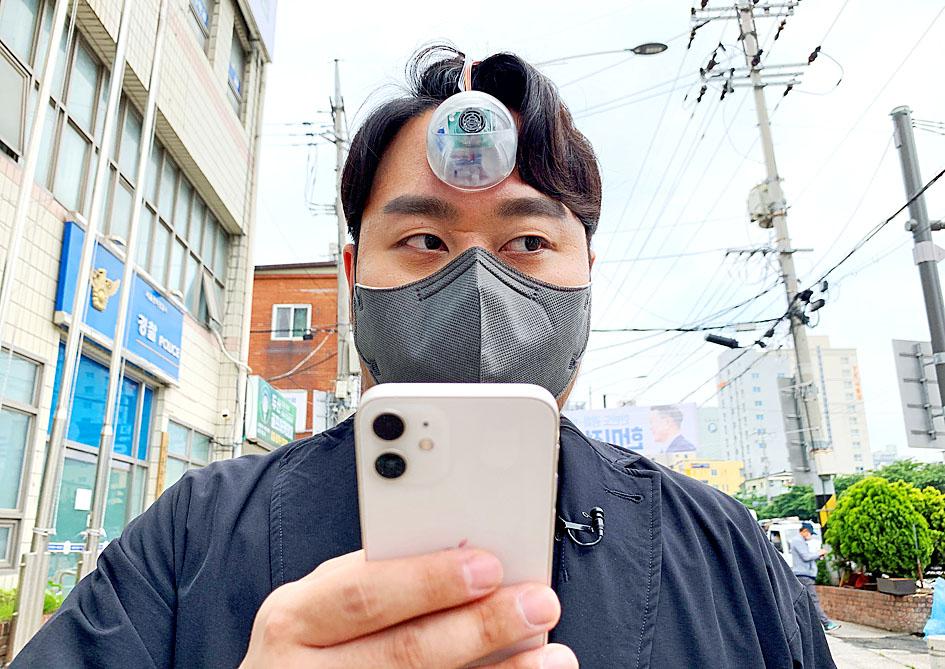A South Korean industrial designer has come up with a satirical solution for “smartphone zombies” who cannot take their eyes away from their screen long enough to stop themselves walking into a wall or other obstacle.
Paeng Min-wook, 28, has developed a robotic eyeball he has dubbed “The Third Eye,” which obsessive mobile phone users can strap to their foreheads so they can browse injury-free on the go.
The device opens its translucent eyelid whenever it senses the user’s head has been lowered to look at a smartphone. When the user comes within 1m to 2m of an obstacle, the device beeps to warn of the impending danger.

Photo: Reuters
“This is the look of future mankind with three eyes,” Paeng, a postgraduate in innovation design engineering at the Royal College of Art and Imperial College London, said as he demonstrated use of The Third Eye around Seoul.
“As we cannot take our eyes off from smartphones, the extra eye will be needed in future,” he added.
Paeng’s invention uses a gyro sensor to measure the oblique angle of the user’s neck and an ultrasonic sensor to calculate the distance between the robotic eye and any obstacles. Both sensors are linked to an open-source single-board microcontroller, with battery pack.
Paeng’s demonstration of the device in Seoul this week garnered attention from passersby.
“I thought he looked like an alien with an eye on his forehead,” Seoul resident Lee Ok-jo said. “These days many young people can get into accidents while using their mobile phone. This would be good for them.”
Paeng said that The Third Eye was meant as a warning, not a real solution for smartphone addicts who do not pay attention to where they are going.
“By presenting this satirical solution, I hope people would recognize the severity of their gadget addiction and look back at themselves,” he said.

Real estate agent and property developer JSL Construction & Development Co (愛山林) led the average compensation rankings among companies listed on the Taiwan Stock Exchange (TWSE) last year, while contract chipmaker Taiwan Semiconductor Manufacturing Co (TSMC, 台積電) finished 14th. JSL Construction paid its employees total average compensation of NT$4.78 million (US$159,701), down 13.5 percent from a year earlier, but still ahead of the most profitable listed tech giants, including TSMC, TWSE data showed. Last year, the average compensation (which includes salary, overtime, bonuses and allowances) paid by TSMC rose 21.6 percent to reach about NT$3.33 million, lifting its ranking by 10 notches

Popular vape brands such as Geek Bar might get more expensive in the US — if you can find them at all. Shipments of vapes from China to the US ground to a near halt last month from a year ago, official data showed, hit by US President Donald Trump’s tariffs and a crackdown on unauthorized e-cigarettes in the world’s biggest market for smoking alternatives. That includes Geek Bar, a brand of flavored vapes that is not authorized to sell in the US, but which had been widely available due to porous import controls. One retailer, who asked not to be named, because

SEASONAL WEAKNESS: The combined revenue of the top 10 foundries fell 5.4%, but rush orders and China’s subsidies partially offset slowing demand Taiwan Semiconductor Manufacturing Co (TSMC, 台積電) further solidified its dominance in the global wafer foundry business in the first quarter of this year, remaining far ahead of its closest rival, Samsung Electronics Co, TrendForce Corp (集邦科技) said yesterday. TSMC posted US$25.52 billion in sales in the January-to-March period, down 5 percent from the previous quarter, but its market share rose from 67.1 percent the previous quarter to 67.6 percent, TrendForce said in a report. While smartphone-related wafer shipments declined in the first quarter due to seasonal factors, solid demand for artificial intelligence (AI) and high-performance computing (HPC) devices and urgent TV-related orders

MINERAL DIPLOMACY: The Chinese commerce ministry said it approved applications for the export of rare earths in a move that could help ease US-China trade tensions Chinese Vice Premier He Lifeng (何立峰) is today to meet a US delegation for talks in the UK, Beijing announced on Saturday amid a fragile truce in the trade dispute between the two powers. He is to visit the UK from yesterday to Friday at the invitation of the British government, the Chinese Ministry of Foreign Affairs said in a statement. He and US representatives are to cochair the first meeting of the US-China economic and trade consultation mechanism, it said. US President Donald Trump on Friday announced that a new round of trade talks with China would start in London beginning today,